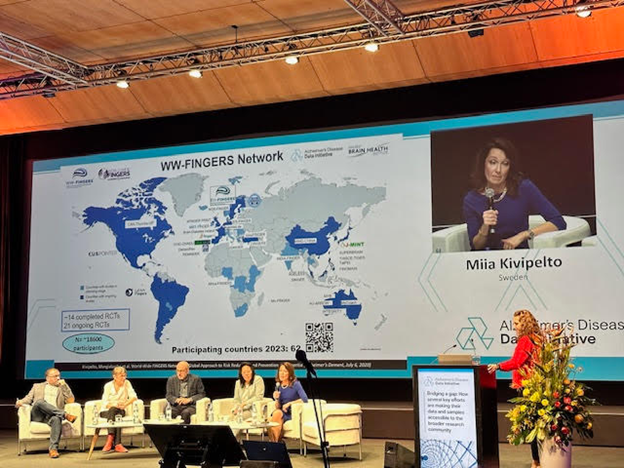|
|
|
|
FROM THE DESK OF NIRANJAN BOSE, INTERIM EXECUTIVE DIRECTOR
|
When I last sent you a note, our team was getting ready to attend AD/PD 2024, the International Conference on Alzheimer’s and Parkinson’s Diseases and related neurological disorders.
The meeting, held in Lisbon, was a great success, not only because it gave us the chance to learn from so many of you but, also, because it allowed us the opportunity to build on existing collaborations – and forge new ones under the umbrella of the event’s theme: striving for a better future for all of those affected by neurodegenerative diseases.
|

|
AD Data Initiative Symposium: Bridging a Gap: How several key efforts are making their data and samples accessible to the broader research community
|
Personally, I was inspired to hear new insights from the likes of Dr. Henrik Zetterberg, who spoke about new blood-based biomarkers for AD, and Dr. Charlotte Teunissen, who shared how protein panels in biofluids can best be used in clinical diagnosis. I was happy to learn about how innovative technologies in our field, including the video-based platform presented by Dr. Jun-Hwan Shin, might aid the monitoring of neurodegenerative disease symptoms.
I was also delighted to see many of our partners and Advisory Board members visit the AD Data Initiative’s booth and continue to emphasize the power of collaboration.
After Portugal, we welcomed news from our partners at Global Alzheimer's Platform Foundation (GAP), who recently launched an exciting open-access data competition. Hosted in Scotland, the Bio-Hermes Biomarker Data Challenge will have researchers digging into the most comprehensive set of dementia biomarker data from early blood testing studies for Alzheimer’s disease, to find new paths to timely prediction and diagnosis of AD and related dementias.
Dementia research needs new ideas, as well as collaborative and even left-field research. It’s a sentiment shared by many, including George Vradenburg and Oliver Schwab, who write – in a special issue of Scientific American, produced in partnership with the Davos Alzheimer’s Collaborative – that “It’s time for a global effort to defeat Alzheimer’s.” It’s why this is such an enthusing time. By supporting the work coming out of so many different initiatives, we may just very well be, as Bill Gates says in the magazine, “at a tipping point with Alzheimer’s Disease.” I’m excited to continue our work.
|
|
|
|
|
|
Best,

Niranjan Bose
Interim Executive Director
AD Data Initiative
|
|
|
|
|
|
OUR PROGRESS AT A GLANCE
|
|
|
-
Data from over 80,000 test results from the Bio-Hermes study are now accessible to researchers in Scotland through the AD Workbench from the Alzheimer’s Disease Data Initiative, a global, secure, cloud-based data sharing and analytics environment. (This data will be made publicly available in 2025, potentially offering vital insights into Alzheimer’s disease prediction, diagnosis, and treatment).
|
|
|
NEW DATASETS NOW ACCESSIBLE VIA THE AD WORKBENCH
|
-
10/66 Dementia Research Study: Since 2003, the 10/66 Research Group, a part of Alzheimer’s Disease International (ADI), has led the largest longitudinal population-based study in Latinos, expanding from the Caribbean (Cuba, Dominican Republic, and Puerto Rico) to North America (Mexico) and South America (Peru, Venezuela). Beginning in 2023/2024, as part of its mission to make research more inclusive, the Davos Alzheimer’s Collaborative, worked with the 10/66 Research Group to share data via the AD Data Initiative from six Latin American countries from older adults focusing on dementia and other non-communicable diseases related to aging. The research encompasses diverse behavioral and clinical assessments, social and economic data, and care arrangements, primarily aimed at informing policy and understanding disease impact in underrepresented regions. This comprehensive dataset also enables meaningful comparisons with other large-scale population studies, offering unique insights into the epidemiology of dementia in this diverse population.
|
-
Lilly EXPEDITION 1,2,3 and EXT via interoperability with the Vivli Platform: LY2062430 (solanezumab) is a humanized anti-A Beta peptide immunoglobulin G-1 (IgG1) monoclonal antibody that was being developed for the treatment of AD. The Phase 3 EXPEDITION 1,2,3 trials enrolled over 4,000 participants from sites in 16 different countries. Researchers can now discover the solanezumab phase 3 data through the AD Workbench and submit access requests through interoperability with the Vivli platform.
|
Discoverable Soon via the AD Workbench
|
-
Answer ALS Db: Answer ALS was conceived to help fill the knowledge gap by carefully building a clinical and in-depth biological picture of ALS from over 1,000 study participants and 200 healthy controls. For each participant, the program generates longitudinal clinical data, whole-genome sequences, and multi-omics (transcriptomics, epigenomics, and proteomics) from induced pluripotent stem cell-derived motor neurons. More details here.
|
|
|
-
AHA - Synthetic Stroke Dataset: The American Heart Association (AHA) hosted a Stroke Data Challenge to encourage research on the impact of social and structural determinants of health on stroke. A unique dataset was created by merging the Get With The Guidelines-Stroke (GWTG-Stroke) registry data with county-level health metrics to understand how these factors impact stroke presentation, care, and outcomes. This is a synthetic subset of the data that has 1,000 records to be used for exploratory data analysis.
|
For more updates please visit: News and Updates
|
|
|
|
|
|
EVENTS
|
Key Conference Schedule
|
May 2024
|
9th European Synapse Meeting
02 – 04 May 2024
Berlin, Germany
|
2024 Hybrid Spring ADRC Meeting
06-07 May 2024
Austin, Texas
|
JAX Course: Principles and Techniques for Improving Preclinical to Clinical Translation in Alzheimer's Disease Research
06 – 10 May 2024
Bar Harbor, Maine and Online
|
BcnPit: XIII Biennial Conference Barcelona-Pittsburgh
15 – 17 May 2024
Barcelona, Spain
|
Summer Data Immersion Program 2024: Life Course Contexts and Alzheimer’s Disease and Related Dementias
20 – 23 May 2024
Ann Arbor, Michigan
|
EMBO Workshop: Microglia in Health and Disease
21 – 24 May 2024
Genoa, Italy
|
Alzheimer Society International Congress™ (ASIC 2024™)
21 – 23 May 2024
San Francisco, California
|
ISMND 2024: Aging, Immunity and Peripheral Factors in Neurodegenerative Diseases
26 – 29 May 2024
Seoul, South Korea
|
Neuro4D 2024
27 – 28 May 2024
Mainz, Germany
|
International Society for Molecular Neurodegeneration 2024 Conference (ISMND 2024)
27 – 29 May 2024
Seoul, South Korea
|
AOCN2024: Annual Meeting of the Japanese Society of Neurology (65th) and Asian Oceanian Congress of Neurology (19th)
29 May – 01 June 2024
Tokyo, Japan
|
|
|
|
June 2024
|
Keystone Symposium: Neuroimmune Interactions: Nervous System and Immune Cell Heterogeneity in Health and Disease
03 – 06 June 2024
Santa Fe, New Mexico
|
Keystone Symposium: Neurodegenerative Diseases
03 – 06 June 2024
Santa Fe, New Mexico
|
Australian Dementia Research Forum 2024
03 – 05 June 2024
Gold Coast, Queensland, Australia
|
IBANGS: Genes, Brain and Behavior 2024
03 – 06 June 2024
London, Ontario, Canada
|
Gordon Research Seminar- Advancing Translational Research: New Technologies, Insights, and Treatments for Neurological Disease
08 – 09 June 2024
New London, New Hampshire
|
Gordon Research Conference: Genetics to Physiology and Bench to Bedside; Barriers of the CNS
09 – 14 June 2024
New London, New Hampshire
|
EMBO Lecture Course: Post-Transcriptional Regulation in Ageing and Age-Related Diseases
10 – 15 June 2024
Greater Noida, India
|
|
|
|
|
|
|
|
© Alzheimer's Disease Data Initiative 2024 | Click here to unsubscribe or to change your Subscription Preferences.
|
|
|
|
|